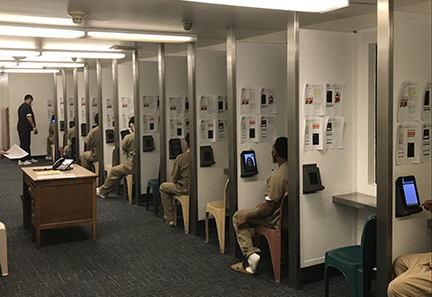‘Family connection and support is vital,’ Sheriff Alisa Gregory says
Henrico County jail inmates were meeting in person with family and friends an average of 100 times per day before sweeping measures to contain the coronavirus abruptly ended the visitations last March.
While safety protocols have largely limited them to telephone calls during the past year, inmates are now getting a better option to stay in touch with loved ones – video calls.
Under a comprehensive jail services contract with GTL, the Sheriff’s Office has received 70 multimedia tablets that are designed for use in correctional facilities. The devices support video calls through an app called GettingOut and the potential for other benefits, including access to entertainment and resources for education and the development of life skills.
“We all know what isolation can do to the psyche. We’ve all experienced it the past year, and we’re not locked up,” Sheriff Alisa A. Gregory said. “A phone call is so different than being able to talk face to face or see each other on a video screen. Plus, having that family connection and support is vital to inmates’ mental health.”

GettingOut works similar to Zoom, FaceTime and other video chat and meeting platforms, but it offers safety features that are essential for correctional institutions, including constant monitoring and control by jail staff.
The Virginia Department of Corrections has offered video visitation since 2018 through a partnership with the nonprofit Assisting Families of Inmates, according to a department spokesman.
The Sheriff’s Office began testing the tablets and technology in March, allowing 367 video calls between inmates and their loved ones over three days. The effort hit a few snags, largely due to unfamiliarity with GettingOut and some of its technical requirements, officials said.
Before participating in a video call with an inmate, a person must download the GettingOut and GettingOut Visits apps for Apple mobile devices or the GTL GettingOut and GO Visits apps for Android devices.
After setting up an account in the GettingOut app, the person will choose Jail West or Jail East, select the inmate’s name and then receive an email or text message to be verified and placed in his or her list of contacts. To accept a call, the person will receive a notification from the app. More information is online.
In general, Henrico inmates in the jails’ general population are allowed one call per week that is scheduled from Friday through Sunday.
While the technology has been available for some time, the Sheriff’s Office had not pursued it before the pandemic. Michael L. Wade, who retired at the end of 2019 after 20 years as Henrico’s sheriff, strongly believed in the benefits of in-person visits for inmates and did not want to discourage those interactions, said Gregory, who worked as undersheriff to Wade.

She said the pandemic forced a new perspective about video visitation and its wide range of benefits, such as allowing inmates to see more of their family members and friends, including those who might be unable to travel to Henrico’s jails. In addition, the virtual visits do not carry the risk of contraband being brought into the facilities, she added.
“Video visitation is not normal, but it has a lot of pluses,” said Gregory, who became sheriff in January 2020 following her election the previous November. “Family can visit from wherever they are. COVID has made us change our priorities and look at things in a different way.
“This may be our new normal,” she added.
While 70 tablets are currently divided equally between Jail West and Jail East, their use is limited by the number of visitation booths. Jail West has 16 booths with tablet docking stations; Jail East has 26. Gregory hopes to eventually be able to assign each inmate a tablet for his or her use during authorized times. Henrico’s jails typically house 1,360 inmates between Jail West and Jail East.
In addition to facilitating video calls, the tablets could eventually allow access to movies, games, music, email, books and other legal and educational resources. The devices also may allow inmates to meet privately with their attorneys.
“This is the tip of the iceberg,” she said of the video calls.
Gregory said she also hopes the tablets will help restore some normalcy to inmates’ lives and help them strengthen their relationships with loved ones.
“Visitation, meals, telephone – those things are highly valued and can affect the morale of inmates and staff,” she said. “Visitation is one of the things that helps things run smoothly.”







